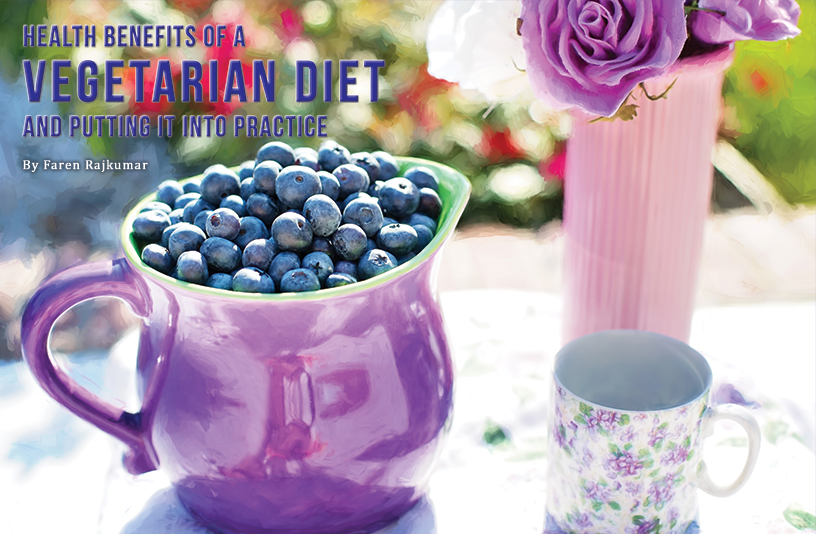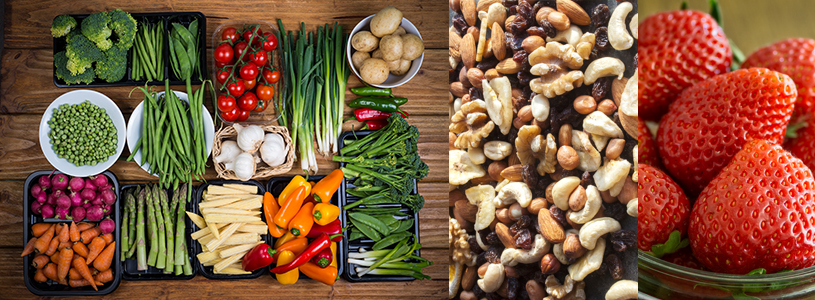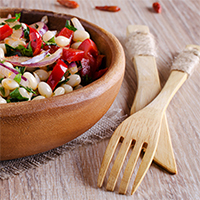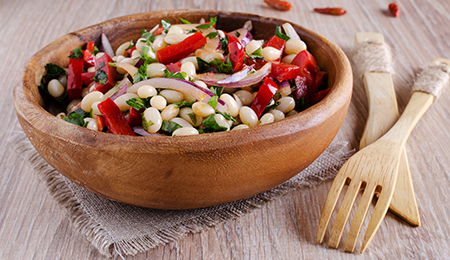Health Benefits of a Vegetarian Diet and Putting It into Practice
 |
|
Choosing to adopt a vegetarian diet, even for a few days a week, has countless health benefits that also help the earth by reducing pollution, food waste, and unnecessary abuse of animals. It’s an obvious step in the direction of being a conscientious and compassionate human being. So start living better today! |
|
| Health Benefits of a Vegetarian Diet It goes without saying that as a vegetarian, you’ll be eating a lot of vegetables. But this doesn’t mean boring meals. Instead of chicken, fish, or steak, your plate will be loaded with more colorful and flavorful options that offer a wider spectrum of vitamin and nutrient content than mere protein, fat, and sodium. This kind of diet leads to the consumption of mostly whole, unprocessed, and highly nutritious foods, including vegetables, fruits, grains, nuts, beans, eggs, and milk. Foods such as these are best eaten fresh, raw, or lightly cooked, because it maximizes their nutritional value and imparts the most vitamins to your body. Be wary of damaging your health by filling your diet with empty calories and simple carbohydrates, like pasta, white bread, potatoes, or over-processed meat replacements. The over-processed soy in veggie dogs and other faux meat products is high in estrogen, which can lead to hormonal imbalance. Always opt for unprocessed soy or tempeh, which is easy to cook, delicious, and easy on the digestive system. |
 |
|
For side dishes, always choose fresh or even frozen vegetables that are easy to cook in countless ways, from baked and broiled to steamed and stir-fried. In addition to vegetables, round off your meals with complex carbohydrates such as quinoa, brown rice, or wheat instead of pasta, white bread, or potatoes. After even a few days of a vegetarian diet, you may experience an increase in energy, particularly in the morning or after meals. This is when most people are typically tired, sluggish, and craving caffeine, but because your body is no longer working overtime to digest fatty meats and excess protein, you will feel properly fueled and active. This leads to an improved sleep cycle, allowing you to wake up early and experience a productive day that leads to tiredness in the evening. Better sleep means a stronger immune system, decreased stress, anxiety, and depression, and even faster recovery from serious illness. |
|
 |
|
Balancing Vegetarianism with Protein Intake
|
 |
| Eggs, milk, and yogurt are good sources of animal-derived protein that are still acceptable in a vegetarian diet, but healthy sources of protein can be entirely plant based, such as beans, soy, nuts, and grains such as quinoa and buckwheat.These ingredients can be easily incorporated into meals and snacks as replacements for unhealthy meats, and will impart all the necessary protein without the unwanted fats and hormones.
For example: one cup of dried beans, one cup of quinoa, and one avocado not only constitute a complete and delicious meal, but also contain approximately 24 grams of protein. Two daily meals such as this, with varying types of grains, beans, and vegetables, will ensure a well-balanced vegetarian diet. |
|
 |
|
Make a Conscious Choice to Be Healthy |
|



 Most Americans battle with health issues every day, from unwanted weight gain and fatigue to high cholesterol and diabetes. So many of these problems can be attributed to poor diets full of unnecessary meat, poultry, fish and seafood. Contrary to popular belief, a meal is not incomplete if it doesn’t contain some kind of animal product. In fact, vegetarian meals are often the best choice because not only are they low in saturated fat and empty calories, but they are also cruelty-free, more affordable, and easy to make at home.
Most Americans battle with health issues every day, from unwanted weight gain and fatigue to high cholesterol and diabetes. So many of these problems can be attributed to poor diets full of unnecessary meat, poultry, fish and seafood. Contrary to popular belief, a meal is not incomplete if it doesn’t contain some kind of animal product. In fact, vegetarian meals are often the best choice because not only are they low in saturated fat and empty calories, but they are also cruelty-free, more affordable, and easy to make at home.





















